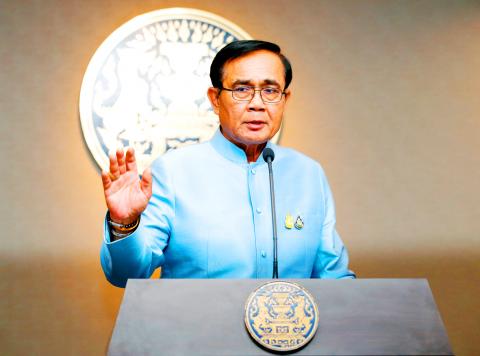Shares of companies linked to a billionaire politician who campaigned in Thailand’s election on a pledge to legalize marijuana on Monday leaped after partial results suggested that his party could be a key part of a coalition government.
Results from Sunday’s election showed that a pro-military party and an opposition party linked to the army’s nemesis, self-exiled former Thai prime minister Thaksin Shinawatra, had won the largest share of parliament seats announced so far.
However, both the pro-army Palang Pracharat and the opposition Pheu Thai could seek support from Anutin Charnvirakul’s Bhumjaithai (“Proud to Be Thai”) Party to cobble together a majority of parliamentary seats needed to form a coalition government.

Photo: EPA-EFE
The Bhumjaithai Party won 39 of 350 lower house seats already decided. The winners of a further 150 seats, which were contested according to a system similar to proportional representation, might not be known before May 9.
Anutin, an amateur pilot, could be a compromise candidate for prime minister if neither of the two leading parties can form a government, and members of his party could receive influential ministry portfolios.
Sino-Thai Engineering and Construction PCL shares closed up 3 percent and steelmaker STP&I PCL rose 2.5 percent.
They bucked the Thai index, which closed down 1.2 percent on concerns that the election would be inconclusive and a broader regional decline.
Anutin holds a 10 percent stake in STP&I and is the former president of Sino-Thai Engineering and Construction.
“This is all knee-jerk reaction,” said Maria Lapiz, head of institutional research at Maybank Kim Eng Securities Thailand, adding that Sino-Thai’s balance sheets were already strong and would not be affected by the outcome of the election.
Anutin, which also backs a four-day work week and legalizing ride-hailing, was part of a previous Thaksin-led government, but is also seen as close to the junta that took over after a 2014 military coup.
Last year, Thai Prime Minister Prayuth Chan-ocha visited Buriram Province, Bhumjaithai’s stronghold, where thousands of supporters filled a stadium to welcome him.
In October last year, ride-hailing start-up Grab launched a program in Buriram to support the local economy.
Shares in Thaksin-linked companies fell on Monday amid concerns that Pheu Thai had fared worse than expected in the election. Real-estate developer SC Asset PCL closed down more than 5 percent and Praram 9 Hospital Pcl lost 2.7 percent.
Thaksin’s daughters hold a majority stake in SC Asset, while his ex-wife, Potjaman Damapong, holds 37 percent of Praram 9 Hospital.
However, analysts said that the luxury condo and hospital sectors are not likely to be affected by the political changes ahead.

Meta Platforms Inc offered US$100 million bonuses to OpenAI employees in an unsuccessful bid to poach the ChatGPT maker’s talent and strengthen its own generative artificial intelligence (AI) teams, OpenAI CEO Sam Altman has said. Facebook’s parent company — a competitor of OpenAI — also offered “giant” annual salaries exceeding US$100 million to OpenAI staffers, Altman said in an interview on the Uncapped with Jack Altman podcast released on Tuesday. “It is crazy,” Sam Altman told his brother Jack in the interview. “I’m really happy that at least so far none of our best people have decided to take them

BYPASSING CHINA TARIFFS: In the first five months of this year, Foxconn sent US$4.4bn of iPhones to the US from India, compared with US$3.7bn in the whole of last year Nearly all the iPhones exported by Foxconn Technology Group (富士康科技集團) from India went to the US between March and last month, customs data showed, far above last year’s average of 50 percent and a clear sign of Apple Inc’s efforts to bypass high US tariffs imposed on China. The numbers, being reported by Reuters for the first time, show that Apple has realigned its India exports to almost exclusively serve the US market, when previously the devices were more widely distributed to nations including the Netherlands and the Czech Republic. During March to last month, Foxconn, known as Hon Hai Precision Industry

PLANS: MSI is also planning to upgrade its service center in the Netherlands Micro-Star International Co (MSI, 微星) yesterday said it plans to set up a server assembly line at its Poland service center this year at the earliest. The computer and peripherals manufacturer expects that the new server assembly line would shorten transportation times in shipments to European countries, a company spokesperson told the Taipei Times by telephone. MSI manufactures motherboards, graphics cards, notebook computers, servers, optical storage devices and communication devices. The company operates plants in Taiwan and China, and runs a global network of service centers. The company is also considering upgrading its service center in the Netherlands into a

Taiwan’s property market is entering a freeze, with mortgage activity across the nation’s six largest cities plummeting in the first quarter, H&B Realty Co (住商不動產) said yesterday, citing mounting pressure on housing demand amid tighter lending rules and regulatory curbs. Mortgage applications in Taipei, New Taipei City, Taoyuan, Taichung, Tainan and Kaohsiung totaled 28,078 from January to March, a sharp 36.3 percent decline from 44,082 in the same period last year, the nation’s largest real-estate brokerage by franchise said, citing data from the Joint Credit Information Center (JCIC, 聯徵中心). “The simultaneous decline across all six cities reflects just how drastically the market